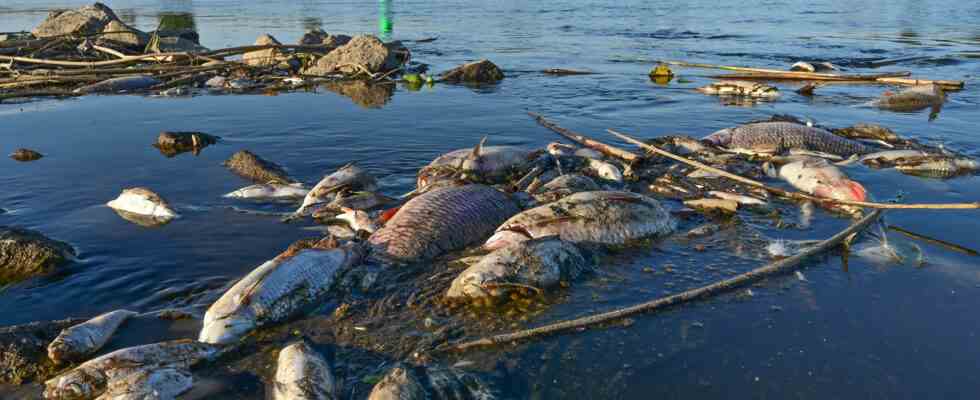Status: 08/14/2022 12:42 p.m
Task forces on both sides of the German-Polish border collect dead fish carcasses. Meanwhile, the search for the cause of the fish kill in the Oder continues. Poland now excludes heavy metals.
According to the Polish government, the death of fish in the Oder is not due to heavy metals. This would have resulted in further analyzes of dead fish by the State Veterinary Institute, Environment Minister Anna Moskwa wrote on Twitter. The government in Warsaw had previously ruled out elevated mercury levels as the cause.
However, the analyzes indicated increased salt levels in the water and therefore agreed with the findings of the German authorities, Moskwa told the PAP news agency. “The high salinity of the Oder may have activated other toxic substances in the water or in the bottom sediment. The toxicological examination of the fish will help identify any pollutants that contributed to the deaths of the animals.”
Brandenburg’s Environment Minister Axel Vogel (Greens) had previously stated that the Oder had “very much increased salt loads”. The term salt loads refers to salts dissolved in the water.
Poland’s government suspects that the river was poisoned with chemical waste. The Polish police have offered a reward of the equivalent of 210,000 euros for the investigation.
Fish deaths in the Oder: environmental catastrophe becomes visible in Poland
Olaf Bock, ARD Warsaw, daily topics 11:25 p.m., August 14, 2022
Lemke: Initial problems with cooperation with Poland
During a visit to Frankfurt (Oder) near the border, Federal Environment Minister Steffi Lemke acknowledged initial problems with cooperation with Poland. She has now agreed on better coordination, she said. The Greens politician spoke there with emergency services from the fire brigade and technical relief organization.
She criticized the lack of information from Poland. “The question of German-Polish cooperation obviously didn’t work at this point,” said the minister. “Otherwise we would have received information earlier, at least from the state of Brandenburg or the neighboring municipalities.”
Federal Environment Minister Lemke speaks to helpers in Frankfurt (Oder).
Image: REUTERS
Joint expert commission announced
Brandenburg had also openly criticized that it had not been informed by the Polish authorities. Lemke said that she had already agreed in a first meeting with her Polish counterpart Moskwa on Friday that there should be a joint expert assessment of the situation and an exchange of the analysis results.
She announced further talks with Moskva. “And we will certainly deepen the subject at the German-Polish environmental council the week after next.” The still existing ignorance about the extent of the catastrophe, the length and the consequences for the food chain and nature, “that drives me massively,” said Lemke.
“But precautions to protect the population are taken by the measurements and then by appropriate warnings from the German side.”
Consequences for the Baltic Sea not excluded
The Ministry of the Environment in Mecklenburg-Western Pomerania expects the effects of the fish kill on the Szczecin Lagoon. So far, according to the ministry, no dead fish have been discovered there. Neither the water police nor residents reported this.
As a precaution, the ministry called on residents to refrain from fishing and taking water from the waters, regardless of use. The responsible authorities in Mecklenburg-Western Pomerania are currently preparing water and fish samples. The Szczecin Lagoon is an inner coastal water in the estuary of the Oder and the Peene. It is the second largest lagoon in the Baltic Sea.

